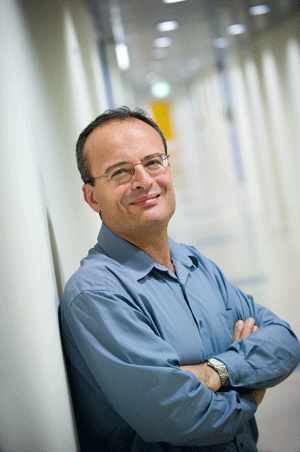B.Sc(Hons)(UWA), Ph.D(UWA)
Phone: +61 3 9905 4526
Fax: +61 3 9905 4597
email: Leone.Spiccia@monash.edu
|
|
• 2006-
|
¦ Professor of Chemistry, Monash University
|
|
• 2008-10
|
¦ Physics, Chemistry and Earth Sciences Panel, Australian Research Council
|
|
• 2006-08
|
¦ Deputy Dean, Faculty of Science, Monash University
|
|
• 2006-07
|
¦ Associate Dean Research, Faculty of Science, Monash University
|
| • 2003-06
|
¦ Deputy Head, School of Chemistry, Monash University
|
| • 2003-04 |
¦ Associate Head Postgraduate Students, School of Chemistry, Monash University |
| • 1999-02 |
¦ Postgraduate Coordinator, School of Chemistry, Monash University |
| • 1998-05 |
¦ Reader in Chemistry, Monash University |
| • 1997 |
¦ Visiting Professor, Swiss Federal Institute of Technology, Lausanne, Switzerland |
| • 1997 |
¦ Visiting Professor, University of Heidelberg, Germany, |
| • 1993-98 |
¦ Senior Lecturer, Monash University |
| • 1987-93 |
¦ Lecturer, Monash University |
| • 1986-87 |
¦ Post-doctoral Fellowship with Prof AM Sargeson, Australian National University |
| • 1984-86 |
¦ Post-doctoral Fellowship with Prof W Marty, Universite de Neuchâtel, Switzerland |
| • 1983-84 |
¦ Post-doctoral Fellowship with Prof TW Swaddle, University of Calgary, Canada |
| • 1979-83 |
¦ PhD degree, University of Western Australia |
| • 1975-78 |
¦ Bachelor of Science Honours degree, University of Western Australia |
|
|
|
• 2010
|
¦ Humboldt Research Award
|
|
• 2007
|
¦ Forschungszentrum Dresden-Rossendorf Fellow, Dresden, Germany
|
|
• 2005
|
¦ Vice-Chancellor’s Award for Postgraduate Supervision, Monash University
|
|
• 2004-
|
¦ Member of the American Chemical Society
|
| • 1996-
|
¦ Fellow of the Royal Australian Chemical Institute
|
| • 1978- |
¦ Member of the Royal Australian Chemical institute |
|
General, inorganic and bio-inorganic chemistry level 1-4 courses taught with emphasis on:
- coordination and inorganic chemistry
- bio-inorganic chemistry
- kinetics and reactivity of metal complexes
- metal ions in biology
- electron transfer reactions of metalloproteins
- techniques and methods in inorganic chemistry
- advanced problem solving
|
|
Research interests are centred around the design, synthesis and application of molecular precursors, functional molecules and new materials, and the elucidation of the structure, properties and reactivity of metal complexes through the application of analytical, spectroscopic, X-ray diffraction, kinetic and thermodynamic techniques. These research activities range from being mainly fundamental in nature to including a variety of applied and commercial projects and bridge across the discipline of chemistry (organic, inorganic, physical and spectroscopy).
Ongoing projects include:
- Bio-inspired water oxidation catalysts and water splitting devices
- Novel materials for application in dye sensitized solar cells
- Molecules as minerals – metal ion speciation and complexation in aqueous solution
- High affinity agents for the selective binding and sensing of biomolecules
- Application of immobilized macrocyclic metal complexes in protein purification
- Diagnostics, therapeutics and biosensors based on metal complex-bioconjugates
- Artificial nucleases and ribonucleases
- Agents for the treatment of HIV
- Bio-inspired water oxidation catalysts and water splitting devices
- Agents for the imaging and treatment of cancer and Alzheimer’s disease
Collaborative projects are being pursued with colleagues from:
- Chemistry, Materials Engineering, Monash Institute for Pharmaceutical Sciences and Monash Centre for Electron Microscopy
- CSIRO, St Vincent’s Hospital and the Adelaide Museum
- The Universities of Adelaide, Deakin, LaTrobe, Melbourne, Queensland and Wollongong and the Australian National University
- EPF Lausanne, UC Berkeley, Davis and San Diego, the Universities of Bochum, Heidelberg, Würzburg and Zurich, Rutgers University, Karlsruhe Institute of Technology, Helmholtz Zentrum Berlin and Helmholtz Zentrum Dresden–Rossendorf
For complete details about the ongoing research projects in the group please visit the research page.
|
|
- Substantial research support from the Australian Research Council through the Discovery, Linkage Industry, Linkage International and LIEF programs, and through the Australian Centre of Excellence for Electromaterials Science. Major funding is also being received from the Australian Solar Institute, VSA and SERD grants from the Victorian State Government to the Victorian Organic Solar Cell (VICOSC) Consortium, the Bioimaging Cooperative Research Centre, Go8-DAAD and DEST ISL-DAAD grants
- Over 260 refereed publications and patents
- Over 200 lecture/poster presentations at local and international conferences
- Invitations to give lectures at many local and overseas universities and conferences
- Supervised 29 PhD and 2 Masters students to completion and there are currently 12 PhD students conducting their studies under the supervision
|
|
|
|
|
